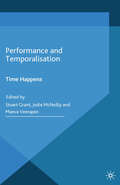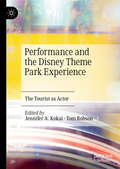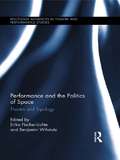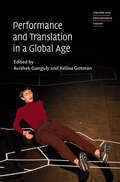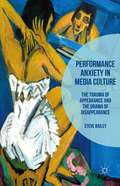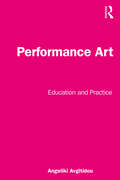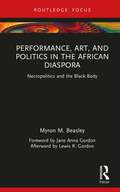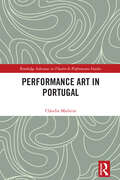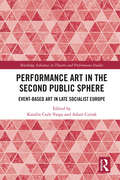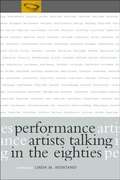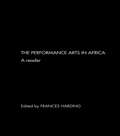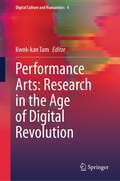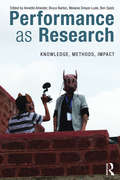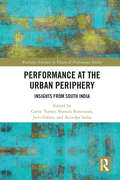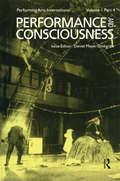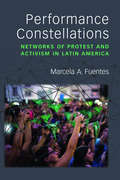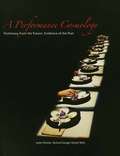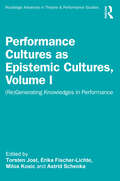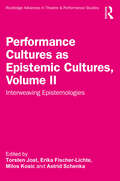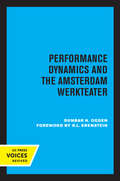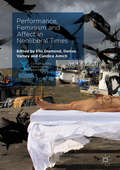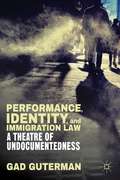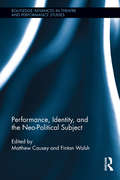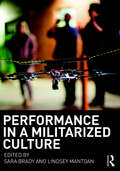- Table View
- List View
Performance and Temporalisation
by Stuart GrantPerformance and Temporalisation features a collection of scholars and artists writing about the coming forth of time as human experience. Whether drawing, designing, watching performance, being baptised, playing cricket, dancing, eating, walking or looking at caves, each explores the making of time through their art, scholarship and everyday lives.
Performance and Temporalisation: Time Happens (Performance Philosophy)
by Jodie McNeilly Maeva VeerapenPerformance and Temporalisation features a collection of scholars and artists writing about the coming forth of time as human experience. Whether drawing, designing, watching performance, being baptised, playing cricket, dancing, eating, walking or looking at caves, each explores the making of time through their art, scholarship and everyday lives.
Performance and the Disney Theme Park Experience: The Tourist as Actor
by Jennifer A. Kokai Tom RobsonThis book addresses Disney parks using performance theory. Few to no scholars have done this to date—an enormous oversight given the Disney parks’ similarities to immersive theatre, interpolation of guests, and dramaturgical construction of attractions. Most scholars and critics deny agency to the tourist in their engagement with the Disney theme park experience. The vast body of research and journalism on the Disney “Imagineers”—the designers and storytellers who construct the park experience—leads to the misconception that these exceptional artists puppeteer every aspect of the guest’s experience. Contrary to this assumption, Disney park guests find a range of possible reading strategies when they enter the space. Certainly Disney presents a primary reading, but generations of critical theory have established the variety of reading strategies that interpreters can employ to read against the text. This volume of twelve essays re-centers the park experience around its protagonist: the tourist.
Performance and the Politics of Space: Theatre and Topology (Routledge Advances in Theatre & Performance Studies)
by Erika Fischer-Lichte Benjamin WihstutzFrom its very beginnings, theatre has been both an art and a public space, shared by actors and spectators. As a result, its entity and history is intimately tied to politics: a politics of inclusion and exclusion, of distributions and placements, of spatial appropriation and utopian concepts. This collection examines what is at stake when a theatrical space is created and when a performance takes place; it asks under what circumstances the topology of theatre becomes political. The book approaches this issue from various angles, taking theatre as a cultural paradigm for political dimensions of space in its respective historical context. Visiting the political dimensions of theatrical space in both theatre history and contemporary performance, the volume responds to the so-called spatial turn in cultural and historical studies, and questions a politics of aesthetics that is discussed in continental philosophy. The book visits different levels and linkages between aesthetic theory and geography, art and sociology, architecture and political theory, and geometry and history, shedding new light on theatre, politics, and space, thereby transforming this historically intertwined triad into a transdisciplinary theme.
Performance and Translation in a Global Age (Theatre and Performance Theory)
by Avishek Ganguly Kélina GotmanPerformance Anxiety in Media Culture: The Trauma of Appearance and the Drama of Disappearance
by Steve BaileyPerformance Anxiety in Media Culture.
Performance Art: Education and Practice
by Angeliki AvgitidouPerformance Art: Education and Practice is an introduction to performance art through activities and practice prompts that are framed by seminal moments in the history of the medium as well as the current theoretical discussions surrounding performance. The book begins by introducing the terminology related to performance art and its early history. The basic elements of performance, including the body, objects, space, the public, and the public sphere are approached through thematic and conceptual correlations such as objects as autobiography, body as an expression of gendered identity, performance and the everyday, the augmented body, the archive of performance, and public space as space for intervention. Case studies analysed in each chapter are accompanied by reflective questions and discussion topics. The book proposes a wide range of exercises and comprehensive practice prompts that aim to enhance performance skills, promote experimentation, and encourage an experiential understanding of the theory, history, and concepts relating to performance art. Performance Art: Education and Practice is addressed to students of Fine Arts and Performance Studies from beginner to intermediate level, performance and visual artists who are interested in expanding their knowledge base and creative range, and artist-teachers who are interested in developing their own curriculum and workshop content.
Performance, Art, and Politics in the African Diaspora: Necropolitics and the Black Body (Routledge Focus on Art History and Visual Studies)
by Myron BeasleyThis book examines necropolitics and performance art, with a particular focus on the black body and the African diaspora. In the book, Myron Beasley situates artists as cultural workers and theorists who illuminate the political linkages between their own and others’ specific locales. The focus is an interrogation of the political systems that dictate and determine the value of lives (and decide which lives matter) through a lens of performance and art. Beasley highlights how the performances of rupture, which are of artistic, and historical significance, reveal both strategies of survival and promises of possibility. Artists and curators examined include Jelili Atiku, Giscard Bouchotte, Nona Faustine, Vanessa German, Simone Leigh, Nathalie Anguezomo Mba Bikoro, Ebony Patterson, and Dianne Smith. The volume is an ideal research and reference book for students and scholars of Contemporary Art, African Studies, and Performance Theory.
Performance Art in Portugal (Routledge Advances in Theatre & Performance Studies)
by Cláudia MadeiraThis book explores histories which have only recently been rediscovered by artists and researchers. This study explores the history of Portuguese performance art, in its various "speculative" and "performative" forms. The author approaches this relationship with the re-emergence and centrality of these (semi-)peripheral histories at an international level, whilst identifying some of their unique traits: their cycles of emergence and retraction in Portuguese history; their multiple and complex ontologies; the intertwined relations between the art of performance and the social performance of the Portuguese (regarding topics as sensitive and fracturing as those of the long dictatorship, the colonial war and the revolutionary process, or even the integration of Portugal in the European Community and, more recently, the various 21st century social, political and economic crises). This reading in turn covers the development of the relationship between performance and hybridism, namely, analyzing the recent dimension of meta-hybridism, in the processes of artistic homage that contemporary Portuguese creators have been establishing through access to the histories and archives of this historical genre. This book will be of great interest to students and scholars in theatre and performance studies, performance art and arts in general.
Performance Art in the Second Public Sphere: Event-based Art in Late Socialist Europe (Routledge Advances in Theatre & Performance Studies)
by Katalin Cseh-Varga Adam CzirakPerformance Art in the Second Public Sphere is the first interdisciplinary analysis of performance art in East, Central and Southeast Europe under socialist rule. By investigating the specifics of event-based art forms in these regions, each chapter explores the particular, critical roles that this work assumed under censorial circumstances. The artistic networks of Yugoslavia, Hungary, Latvia, Lithuania, Poland, Romania, East Germany and Czechoslovakia are discussed with a particular focus on the discourses that shaped artistic practice at the time, drawing on the methods of Performance Studies and Media Studies as well as more familiar reference points from art history and area studies.
Performance Artists Talking in the Eighties
by Linda M. MontanoThe interaction of the performance artist Linda Montano with other performance artists to consider how early events associated with sex, food, money/fame, or death/ritual resurfaced in their later work has resulted in a talking performance that documents the production of art in a misunderstood community. Her discussions with more than 100 artists, focused on the relationship between art and life, history and memory, the individual and society, and the potential for individual and social change.
The Performance Arts in Africa: A Reader
by Frances HardingThe Performance Arts in Africa is the first anthology of key writings on African performance from many parts of the continent. As well as play texts, off the cuff comedy routines and masquerades, this exciting collection encompasses community-based drama, tourist presentations, television soap operas, puppet theatre, dance, song, and ceremonial ritualised performances. Themes discussed are: * theory * performers and performing * voice, language and words * spectators, space and time. The book also includes an introduction which examines some of the crucial debates, past and present, surrounding African performance. The Performance Arts of Africa is an essential introduction for those new to the field and is an invaluable reference source for those already familiar with African performance.
Performance Arts: Research in the Age of Digital Revolution (Digital Culture and Humanities #4)
by Kwok-Kan TamThis volume reshapes a contemporary understanding of research in theatre and performance arts. Bringing together distinguished scholars from all over the world, the book serves as an arena for international scholars to introduce innovative research methodologies and disseminate their research findings regarding VLT, data archiving, and digital history and discusses the impacts of digital culture in art production, stage performance, film, and literature. The Ibsen focus in the book is illustrative of the power of digital database research that is generating new relations in spatial-historical dimensions that have otherwise gone unnoticed. It demonstrates how a new methodology can bring practical benefits to handling big data with the support of digital technologies. In line with the post-pandemic landscape, this book engages a reflection on how the digital revolution has brought about changes and challenges, and constraints and breakthroughs within the field of theatre and performance arts. It is of appeal to theatre artists and practitioners, scholars, critics, librarians, digital archive engineers, and postgraduate students interested in theatre, performance studies, digital media, information technology, library science, communication, education, sociology, as well as political science. “The book investigates the latest methodological development in digital cultures and performance arts, which significantly contributes to the ever-changing and increasingly advanced technological culture in this field.” - Jessica Tsui-yan Li, York University, Canada"In line with the post-pandemic landscape, this book engages the reader in reflecting on how the digital revolution has brought about chances and challenges, constraints and breakthroughs to the field of theatre and performance arts. An original, eye-opening and inspiring volume at multiple levels, this book brings together distinguished scholars from all over the world." - Dr Anna Tso, The Hang Seng University of Hong Kong
Performance as Research: Knowledge, methods, impact
by Annette Arlander Bruce Barton Melanie Dreyer-Lude Ben SpatzPerformance as Research (PAR) is characterised by an extraordinary elasticity and interdisciplinary drive. Performance as Research: Knowledge, Methods, Impact celebrates this energy, bringing together chapters from a wide range of disciplines and eight different countries. This volume focuses explicitly on three critical, often contentious themes that run through much discussion of PaR as a discipline: Knowledge - the areas and manners in which performance can generate knowledge Methods - methods and methodologies for approaching performance as research Impact - a broad understanding of the impact of this form of research These themes are framed by four essays from the book's editors, contextualising their interrelated conversations, teasing out common threads, and exploring the new questions that the contributions pose to the field of performance. As both an intervention into and extension of current debates, this is a vital collection for any reader concerned with the value and legitimacy of performance as research.
Performance at the Urban Periphery: Insights from South India (Routledge Advances in Theatre & Performance Studies)
by Anindya Sinha Cathy Turner Jerri Daboo Sharada SrinivasanThis edited volume considers performance in its engagement with expanding Indian cities, with a particular focus on festivals and performances in Karnataka, Tamil Nadu and Kerala. The editors ask how performance practices are affected by urbanisation, the effects of such changes on their cultural economy, and the environmental impacts of performance itself. This project also considers how performance responds to its context, and the potential for performance to be critical of the city’s development, and of its own compromises. Bringing together perspectives from the humanities, natural and social sciences, the book takes a multi-faceted analytical view of live performance, connecting contemporary with heritage forms, and human with more-than-human actors. The three sections, themed around heritage, everyday life, and future ecologies, will be of great interest to students and scholars in performance, heritage studies, ecology and art history.
Performance & Consciousness
by Daniel Meyer-DinkgräfeThis is volume 1, part 4 of the Performing Arts International forum. This collection of essays covers a breadth of topics on the theme of consciousness; addressing the trend of studies trying to put human experience into more concrete, cogent, less poetic and metaphorical terms. Major issues raised by the essays are summarised, and a hypothesis serving as a stimulus for further research and debate is suggested by the volume's conclusion.
Performance Constellations: Networks of Protest and Activism in Latin America (Theater: Theory/Text/Performance)
by Marcela A FuentesPerformance Constellations maps transnational protest movements and the dynamics of networked expressive behavior in the streets and online, as people struggle to be heard and effect long-term social justice. Its case studies explore collective political action in Latin America, including the Zapatistas in the mid-’90s, protests during the 2001 Argentine economic crisis, the 2011 Chilean student movement, the 2014–2015 mobilizations for the disappeared Ayotzinapa students, and the 2018 transnational reproductive rights movement. The book analyzes uses of space, time, media communication, and corporeality in protests such as virtual sit-ins, flash mobs, scarfazos, and hashtag campaigns, arguing that these protests not only challenge hegemonic power but are also socially transformative. While other studies have focused either on digital activism or on street protests, Performance Constellations shows that they are in fact integrally entwined. Zooming in on protest movements and art-activism in Mexico, Argentina, and Chile, and putting contemporary insurgent actions in dialogue with their historical precedents, the book demonstrates how, even in moments of extreme duress, social actors in Latin America have taken up public and virtual space to intervene politically and to contest dominant powers.
A Performance Cosmology: Testimony from the Future, Evidence of the Past
by Judie Christie Richard Gough Daniel WattExploring thirty years of work by The Centre for Performance Research (CPR), A Performance Cosmology explores the future challenges of performance and theatre through a diverse and fascinating series of interviews, testimonies and perspectives from leading international theatre practitioners and academics. Contributors include: Philip Auslander, Rustom Bharucha, Tim Etchells, Jane Goodall, Guillermo Gomez-Pena, Jon Mckenzie, Claire MacDonald, Susan Melrose, Alphonso Lingis, Richard Schechner, Rebecca Schneider, Edward Scheer, and Freddie Rokem. A Performance Cosmology is structured as a travelogue through a matrix of strategic, imaginary, interdisciplinary field stations. This innovative framework enables readings which disrupt linearity and afford different forms of thematic engagement. The resulting volume opens entirely new vistas on the old, new, and as yet unimagined, worlds of performance.
Performance Cultures as Epistemic Cultures, Volume I: (Re)Generating Knowledges in Performance (Routledge Advances in Theatre & Performance Studies)
by Torsten Jost, Erika Fischer-Lichte, Milos Kosic and Astrid SchenkaThis volume investigates performances as situated "machineries of knowing" (Karin Knorr Cetina), exploring them as relational processes for, in and with which performers as well as spectators actively (re)generate diverse practices of knowing, knowledges and epistemologies. Performance cultures are distinct but interconnected environments of knowledge practice. Their characteristic features depend not least on historical as well as contemporary practices and processes of interweaving performance cultures. The book presents case studies from diverse locations around the globe, including Argentina, Canada, China, Greece, India, Poland, Singapore, and the United States. Authored by leading scholars in theater, performance and dance studies, its chapters probe not only what kinds of knowledges are (re)generated in performances, for example cultural, social, aesthetic and/or spiritual knowledges; the contributions investigate also how performers and spectators practice knowing (and not-knowing) in performances, paying particular attention to practices and processes of interweaving performance cultures and the ways in which they contribute to shaping performances as dynamic "machineries of knowing" today. Ideal for researchers, students and practitioners of theater, performance and dance, (Re)Generating Knowledges in Performance explores vital knowledge-serving functions of performance, investigating and emphasizing in particular the impact and potential of practices and processes of interweaving of performance cultures that enable performers and spectators to (re)generate crucial knowledges in increasingly diverse ways.
Performance Cultures as Epistemic Cultures, Volume II: Interweaving Epistemologies (Routledge Advances in Theatre & Performance Studies)
by Torsten Jost, Erika Fischer-Lichte, Milos Kosic and Astrid SchenkaThis volume investigates performance cultures as rich and dynamic environments of knowledge practice through which distinctive epistemologies are continuously (re)generated, cultivated and celebrated. Epistemologies are dynamic formations of rules, tools and procedures not only for understanding but also for doing knowledges. This volume deals in particular with epistemological challenges posed by practices and processes of interweaving performance cultures. These challenges arise in artistic and academic contexts because of hierarchies between epistemologies. European colonialism worked determinedly, violently and often with devastating effects on instituting and sustaining a hegemony of modern Euro-American rules of knowing in many parts of the world. Therefore, Interweaving Epistemologies critically interrogates the (im)possibilities of interweaving epistemologies in artistic and academic contexts today. Writing from diverse geographical locations and knowledge cultures, the book’s contributors—philosophers and political scientists as well as practitioners and scholars of theater, performance and dance—investigate prevailing forms of epistemic ignorance and violence. They introduce key concepts and theories that enable critique of unequal power relations between epistemologies. Moreover, contributions explore historical cases of interweaving epistemologies and examine innovative present-day methods of working across and through epistemological divides in nonhegemonic, sustainable, creative and critical ways. Ideal for practitioners, students and researchers of theater, performance and dance, Interweaving Epistemologies emphasizes the urgent need to acknowledge, study and promote epistemological plurality and diversity in practices of performance-making as well as in scholarship on theater and performance around the globe today.
Performance Dynamics and the Amsterdam Werkteater
by Dunbar H. OgdenThis title is part of UC Press's Voices Revived program, which commemorates University of California Press’s mission to seek out and cultivate the brightest minds and give them voice, reach, and impact. Drawing on a backlist dating to 1893, Voices Revived makes high-quality, peer-reviewed scholarship accessible once again using print-on-demand technology. This title was originally published in 1987.
Performance, Feminism and Affect in Neoliberal Times (Contemporary Performance InterActions)
by Elin Diamond Denise Varney Candice AmichThis book is a provocative new study of global feminist activism that opposes neoliberal regimes across several sites including Asia, Australia, Canada, Europe, Latin America and the United States. The feminist performative acts featured in the book contest the aggressive unravelling of collectively won gains in gender, sexual and racial equality, the appearance of new planes of discrimination, and the social consequences of political economies based on free market ideology. The investigations of affect theory follow the circulation of intensities – of political impingements on bodies, subjective and symbolic violence, and the shock of dispossession – within and beyond individuals to the social and political sphere. Affect is a helpful matrix for discussing the volatile interactivity between performer and spectator, whether live or technologically mediated. Contending that there is no activism without affect, the collection brings back to the table the activist and hopeful potential of feminism.
Performance, Identity, and Immigration Law
by Gad GutermanHow has contemporary American theatre presented so-called undocumented immigrants? Placing theatre artists and their work within a context of on-going debate, Guterman shows how theatre fills an essential role in a critical conversation by exploring the powerful ways in which legal labels affect and change us.
Performance, Identity, and the Neo-Political Subject (Routledge Advances in Theatre & Performance Studies #28)
by Matthew Causey Fintan WalshThis book stages a timely discussion about the centrality of identity politics to theatre and performance studies. It acknowledges the important close relationship between the discourses and practices historically while maintaining that theatre and performance can enlighten ways of being with others that are not limited by conventional identitarian languages. The essays engage contemporary theatre and performance practices that pose challenging questions about identity, as well as subjectivity, relationality, and the politics of aesthetics, responding to neo-liberal constructions and exploitations of identity by seeking to discern, describe, or imagine a new political subject. Chapters by leading international scholars look to visual arts practice, digital culture, music, public events, experimental theatre, and performance to investigate questions about representation, metaphysics, and politics. The collections seeks to foreground shared, universalist connections that unite rather than divide, visiting metaphysical questions of being and becoming, and the possibilities of producing alternate realities and relationalities. The book asks what is at stake in thinking about a subject, a time, a place, and a performing arts practice that would come ‘after’ identity, and explores how theatre and performance pose and interrogate these questions.
Performance in a Militarized Culture
by Sara Brady Lindsey MantoanThe long cultural moment that arose in the wake of 9/11 and the conflict in the Middle East has fostered a global wave of surveillance and counterinsurgency. Performance in a Militarized Culture explores the ways in which we experience this new status quo. Addressing the most commonplace of everyday interactions, from mobile phone calls to traffic cameras, this edited collection considers: How militarization appropriates and deploys performance techniques How performing arts practices can confront militarization The long and complex history of militarization How the war on terror has transformed into a values system that prioritizes the military The ways in which performance can be used to secure and maintain power across social strata Performance in a Militarized Culture draws on performances from North, Central, and South America; Europe; the Middle East; and Asia to chronicle a range of experience: from those who live under a daily threat of terrorism, to others who live with a distant, imagined fear of such danger.

